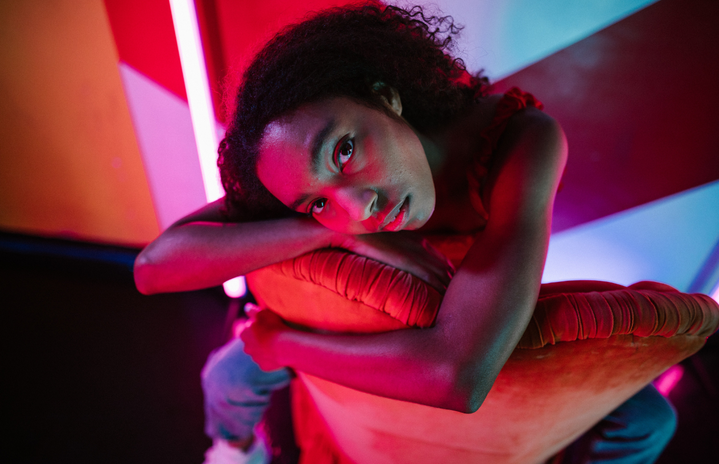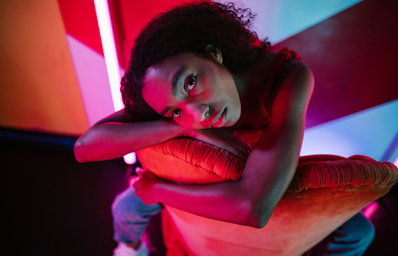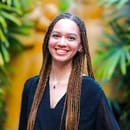Regardless of how much it has sucked, it’s a skill that we, as women of color, will have to continue to fine-tune for the rest of our lives.
Attending a Predominantly White Institution (PWI) as a Person of Color (POC) comes with many struggles that may not be recognizable to the majority.
As a mixed-race, first-generation student, I have experienced feelings of being ostracized, unheard and misunderstood at my PWI. This has ultimately impacted my life in the most formative ways imaginable.
The most unspoken truth about being at a PWI as a woman of color lies within the dating scene: it is terrible.
Dating as a woman of color is something I have struggled with. I often think that my physical appearance is what pulls men away from the idea of me. Is my nose too large for them? My curls too kinky? My vernacular, too “ghetto”?
While I know none of this is true, intrusive thoughts linger in my mind constantly, and it becomes simple to feel hopeless. For some time, I accepted that I would never find romance at my PWI, just because of the massive white majority and my African American decent.
While I cannot blame the white community for not understanding how minorities feel, I still have the access to educate others.
I sought out to amplify the voices of women of color at my university. Dating at a PWI was something that had made me feel less than worthy — did other women feel the same? This topic is continually pushed into the shadows, ignored for those who do not have to confront the issue.
After interviewing three women from varying cultural backgrounds, I discovered that our differentiating experiences are what led us to empathize with one another.
The Interviews
When you go to social events or parties, do you assume that someone could be romantically interested in you?
Subject One: “I sometimes do, but never for the right reasons. As a light-skinned Black woman, I know firsthand that we are often fetishized. It’s also definitely not uncommon for me to hear things such as ‘You’re like the whitest Black girl I know’ or ‘Wow you speak like you’re white,’ almost as if the more they can try to convince themselves I’m not that Black.”
“I question if many of the men I talk to at social events or parties are only speaking to me because they are trying to experiment with a Black girl or if they are just trying to prove they’re not that racist by expressing any interest or giving me a chance,” Subject One said.
“Questions that often race through my head: Am I just a token or a story that starts with ‘So, I actually talked to this Black girl at the club last night and…’? Will my actions that night dictate how this person will view dating Black women or just Black women in general for the rest of their life? If I was just a few shades darker, would they have still talked to me? It’s a really horrible game that has only ever left me suspicious instead of flattered,” Subject One said.
Subject Two: “No. I don’t usually assume [that someone could be romantically interested]. I go into situations with the opposite mindset, thinking ‘I’m too ugly to be here,’ or thinking that people will wonder why I’m there. I think people may look at me and think I’m unattractive and ugly or won’t want to talk to me. With that, goes assuming that they wouldn’t be romantically interested in me. I think it’s because the guys are mostly white.”
“The beauty standard, especially at a PWI, is being a blonde, white girl with blue eyes and tan skin… They want tan skin but not actual tan skin you get from melanin. They want spray-tanned skin. They want bleached blonde hair. So, it feels like those are the types of girls that get attention at parties,” Subject Two said.
Subject Three: “When I go to a lot of my sorority events, I don’t assume anyone could be interested in me. I just go in with the perception that nobody would because there are, always, mostly white people there.”
“I’ve also gone to a lot of events thrown by the Caribbean Student Organization and Black Student Organizations. When I go to those events, I have felt like people are romantically interested in me. This is because people have approached me there but never at my sorority events or at a predominantly white bar,” Subject Three said.
Do you feel like you fit the standard of conventional attractiveness?
Subject One: “I don’t think I have ever believed I fit the definition of conventional attractiveness. Throughout a lot of my life, I was actually bullied regarding my appearance. While I am older now and surrounded by supportive friends, I have carried many of those insecurities into my adulthood.”
“When I look at myself, I often see more of what I don’t like than what I actually do like. I’m curvy in all the wrong places, far too tall and I have this curly hair— where if I stand outside in the Gainesville humidity for more than three seconds, it becomes frizzy. I constantly feel pressure to wake up hours before I need to, to try and make myself more conventional. Just so I can blend into the crowd. Sometimes, it’s unbearable waking up every morning and looking in the mirror, wondering if anyone will ever truly find you attractive. Even yourself,” Subject One said.
Subject Two: “No, I don’t think I do. Even though I’m a cis woman, I’m cis passing, and I’m able-bodied, which is a privilege, I don’t fit the standard of conventional attractiveness. I think the standard is very Eurocentric. Again, that involves light hair and eyes and no visible body hair — which as a person of color, you usually have very dark hair. I think it also expects a certain body type. I have brown skin and eyes and black hair. I have a lot of things that are the opposite of what the conventional beauty standard is.”
Subject Three: “I think I fit the standard in certain communities. In others, people make think I’m ‘pretty,’ but then they’d also never be romantically interested in me. They’ll admire from afar.”
Compared to your peers, would you say you’ve had the opportunity to date more or fewer people at your PWI?
Subject One: “At a PWI, with a guard up, I purposefully passed up on various occasions to date men. I did not trust their intentions.”
“One of my largest problems in college was this struggle between finding men who either wanted to ‘date’ for the night (if you know what I mean) or who wanted a long-term relationship. I really do believe there aren’t many guys who were looking to get to know someone like me,” Subject One said.
Subject Two: “It’s hard to define an opportunity to date. Now with dating apps, what even counts as an opportunity? I think in terms of people who have shown interest in me, beyond just a match on Tinder, which usually results in a creepy question about ‘where I’m from.’”
Subject Three: “I’ve had the opportunity to date fewer people because there’s only a small population that finds me attractive. For some of my friends, it’s very easy for them, but I find it a lot harder for me to do the same.”
Would you say you avoid dating Caucasian people at your PWI?
Subject One: “Unfortunately for me, I’m actually attracted to Caucasian men. I have had to struggle through many of the horribly awkward and blatantly racist moments of dating someone who has often acted as an oppressor of mine in the past. I will say, meeting their parents and friends is hands-down one of the most stressful things in the world.”
Subject Two: “I didn’t, and don’t, avoid dating Caucasian people. I think it’s because [my PWI] is so white. That’s the majority of the people you encounter. It’s hard to avoid that, but I can see why people avoid that. As a woman of color, it always feels like you need to prove yourself a little bit more when you’re dating a white person. I’ve often felt like, ‘Do they really like me, or am I just an exotic experiment for them?’”
Subject Three: “I personally don’t have a racial type. I find myself not really doing much with white people because it’s hard to find white people who are interested in people of color. Also, I feel like they won’t understand the struggles that I go through. This is all a deterrent from me wanting to date white people.”
Do any of your answers to the previous questions have an impact on your emotional or mental well-being?
Subject One: “Totally. Also, my financial well-being because now I have to pay $80 a session for therapy.”
“Constantly questioning your heart and being disappointed by others’ ignorance and hate definitely takes an emotional and mental toll. The heart is fragile, and, in my experience, it can quickly become very cold. Easiest way to do that? Consistently ridicule and break down a woman to then turn around and, years later, objectify and fetishize her. Or, arguably worse, use her to try to prove to yourself you’re actually not a racist,” Subject One said.
“I have struggled for years with self-confidence, anxiety and depression because of this. I remember in high school, year after year, no one asked me to a single school dance when all of my friends could easily secure dates.”
“Finally, for my senior year prom, a kid in my class did, and I was excited. I found out later on that day that he had only done it due to a dare he had with his friends, some of which were also my friends. This spans from romantic relationships to even friendships. I always felt as if my skin color really just shifted the dynamic of the relationship,” Subject One said.
Subject Two:
“I now live in a place with much more diversity than [my alma mater PWI], and I think that my mental health and perception of my own attractiveness has increased so much since I’ve moved. I think it has a lot to do with the fact that I’m not surrounded by white folks who buy into Eurocentric beauty standards.”
“It definitely still has an impact on how I approach romantic relationships. I still take the assumption that I’m ‘ugly.’ So, I definitely took those past experiences with me. But, it helps to be surrounded by people who look like me and others who just aren’t white,” Subject Two said.
Subject Three:
“In the beginning it did. It made me feel less than, like nobody could ever be interested in me. Most of the time I try to ignore it, but it’s normal for me. The more I think about it, the more I realize that it’s sad I have to think that way.”
Overall, please explain any remaining feelings you have toward dating people, as a woman of color, at a PWI.
Subject One: “If I could summarize how I feel about dating people at a PWI as a woman of color is: that shit sucks. But at the end of the day, I remind myself that dating sucks. Sure, is it harder as a [person of color]? Definitely, but there are hurtful, untrustworthy partners everywhere.”
“Regardless of how much it has sucked, it’s a skill that we, as women of color, will have to continue to fine-tune for the rest of our lives. I have definitely learned a lot of valuable lessons from my experiences dating at a PWI but have also left with a plethora of trust issues,” Subject One said.
“I do wonder, though, if my whole perspective is really morphed because I have only ever attended a PWI. I have never had the chance to experience anything different and don’t really have anything else to compare it to. So, this feels somewhat normal to me. Sometimes I even catch myself wondering if dating has been so hard because I am a Black woman at a PWI or just because I am me. I think part of me holds hope that things will be different elsewhere, but I doubt they really will.”
Subject Two: “[Dating as a woman of color at a PWI] is way harder than it needs to be. It feels very dehumanizing. It makes you feel very defeated like something’s wrong with you when there’s not. You just are the person that you are. It can make you feel like even the things that you think are beautiful about you aren’t.”
“In my experience, I was gaslit into feeling like I’m not beautiful, worthy enough, or attractive enough to find a partner,” Subject Two said.
Subject Three:
“Overall, I’ve been exposed to two different sides of my campus. There’s the predominantly white side and then there are the people of color. With POCs, I’ve been approached more and that hasn’t really happened in predominantly white spaces,” Subject Three said.
“Being a part of a sorority, there will be a lot of date functions and events where your friends set you up with a date. I find myself not wanting to participate in that because I know I would get matched with a white guy, and I don’t know if he’d be interested in me because I’m a person of color. That’s the hardest part. Not being able to participate in certain activities because someone may not be attracted to you. If I were white, I wouldn’t have those worries.”
My Conclusion
After speaking with “The Sources,” I spent weeks sobbing.
Every edit I made to this article ended in tears.
Their experiences are muffled, yet so real, and emotions are dismissed, yet incredibly valid. I, myself, had never felt like I could relate to other individuals until speaking to these women. There is vulnerability in speaking your truth, and my sources deserve to be commended endlessly for having the courage to share their experiences.
Why is this so important? If you’re not a person of color and made it this far, this may be the lingering question. However, understanding the trauma and unspoken experiences from other people fuels for a better tomorrow. Situations that have become cultural norms for most are invisible to others. Recognizing someone’s strength is a step forward in uniting humanity, even just at somewhere as small, yet so impactful, as a PWI.


